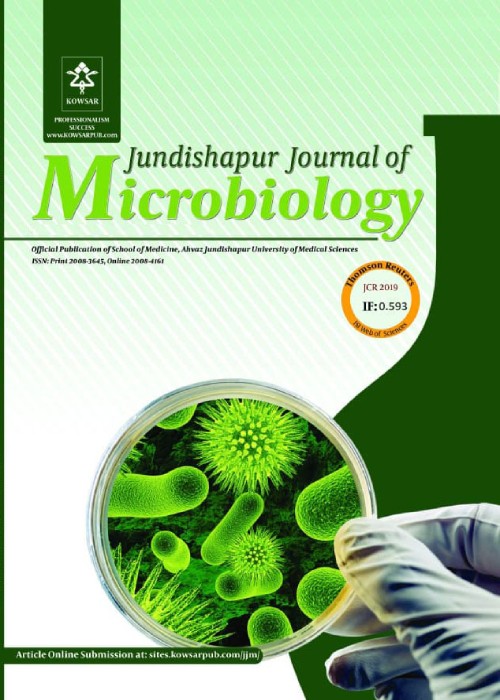Analysis of Bacillus thuringiensis Population Dynamics and Its Interaction With Pseudomonas fluorescens in Soil
Author(s):
Abstract:
Background
Bacillus thuringiensis is the most successful biological control agent, however, studies so far have shown that B. thuringiensis is very sensitive to environmental factors such as soil moisture and pH. Ultraviolet light from the sun had been considered as the main limiting factor for its persistence in soil and it has recently been shown that the antagonism exerted by other native soil organisms, such as Pseudomonas fluorescens, is a determining factor in the persistence of this bacterium under in vitro culture conditions.Objectives
The aim of the present investigation was to analyze the population dynamics of B. thuringiensis and its interaction with P. fluorescens using microbiological and molecular methods in soil, under different conditions, and to determinate the effect of nutrients and moisture on its interaction.Materials And Methods
The monitoring was performed by microbiological methods, such as viable count of bacteria, and molecular methods such as Polymerase Chain Reaction (PCR) and hybridization, using the direct extraction of DNA from populations of inoculated soil.Results
The analysis of the interaction between B. thuringiensis and P. fluorescens in soil indicated that the disappearance of B. thuringiensis IPS82 is not dependent on the moisture but the composition of nutrients that may be affecting the secretion of toxic compounds in the environment of P. fluorescens. The results showed that the recovered cells were mostly spores and not vegetative cells in all proved treatments. The molecular methods were effective for monitoring bacterial population inoculated in soil.Conclusions
Bacillus thuringiensis is very sensitive to the interaction of P. fluorescens, however is capable to survive in soil due to its capacity of sporulate. Some of the cells in the form of spores germinated and folded slightly and remained in a constant cycle of sporulation and germination. This confirms that B. thuringiensis IPS82 can germinate, grow and sporulate in soil.Keywords:
Language:
English
Published:
Jundishapur Journal of Microbiology, Volume:8 Issue: 9, Sep 2015
Page:
9
magiran.com/p1449003
دانلود و مطالعه متن این مقاله با یکی از روشهای زیر امکان پذیر است:
اشتراک شخصی
با عضویت و پرداخت آنلاین حق اشتراک یکساله به مبلغ 1,390,000ريال میتوانید 70 عنوان مطلب دانلود کنید!
اشتراک سازمانی
به کتابخانه دانشگاه یا محل کار خود پیشنهاد کنید تا اشتراک سازمانی این پایگاه را برای دسترسی نامحدود همه کاربران به متن مطالب تهیه نمایند!
توجه!
- حق عضویت دریافتی صرف حمایت از نشریات عضو و نگهداری، تکمیل و توسعه مگیران میشود.
- پرداخت حق اشتراک و دانلود مقالات اجازه بازنشر آن در سایر رسانههای چاپی و دیجیتال را به کاربر نمیدهد.
In order to view content subscription is required
Personal subscription
Subscribe magiran.com for 70 € euros via PayPal and download 70 articles during a year.
Organization subscription
Please contact us to subscribe your university or library for unlimited access!


